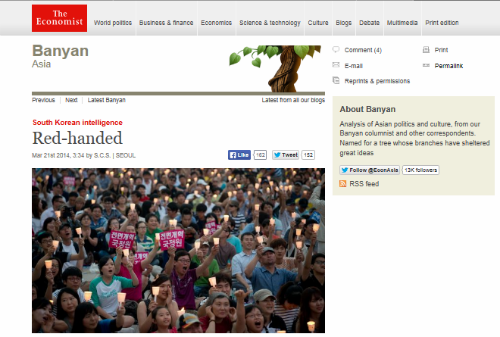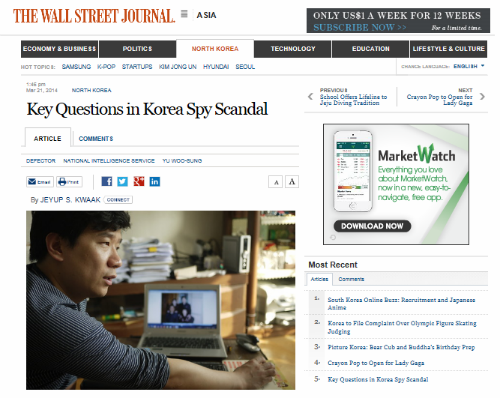WSJ “국정원, 간첩 조작으로 조사 받는 처지”
국가정보원 간첩 증거조작 사건 보도가 연일 쏟아지고 있는 가운데, <이코노미스트>와 <월스트리트 저널> 등 주요 외신들까지도 국내 정보기관의 증거조작 실태를 집중 보도했다.
외신전문번역사이트 <뉴스프로>에 따르면, 영국의 권위 있는 주간지 이코노미스트(The Economist)는 21일 ‘한국 국정원 현행범으로 걸리다’(South Korean intelligence Red-handed)라는 제목으로 국정원 문제를 상세하게 보도했다.

해당 기사는 “최근 30년 전 억울하게 북한의 첩자라는 혐의로 기소됐던 많은 한국 사람들에 대한 판결이 뒤집혀왔다”면서 “이러한 무죄선고 사례들은 현재는 민주국가인 한국이 이전 군사독재가 정치 정적을 고문하고 증거를 조작해서 이들에게 누명을 씌웠던 당시로부터 얼마나 멀리 왔는가를 고무적으로 일깨워준다”고 지적했다.
이어 “한국 국정원은 1999년 두 번째로 이름을 바꿨고, 그 폭력적 성격을 내려놓았지만, 친북선동자들을 잡아내는 것에 대한 이들의 열정은 낮아지지 않은 듯하다”면서, 군사정권 시절부터 지금까지 이어지고 있는 국정원 문제를 꼬집었다.
그러면서 “전 국정원장 원세훈 씨는 지난 대선 전에 온라인상에서 주요 야당 후보들을 종북좌파라고 비난하고 박근혜 후보에 유리하도록 여론을 조작한 혐의로 재판을 받고 있으며, 새로운 정보원장인 남재준은 간첩사건에서 국정원이 증거를 조작한 혐의로 수사를 받고 있는 가운데 야당과 집권당 의원들 모두로부터 사퇴하라는 압력을 받고 있다”며 이명박, 박근혜 정권으로 이어지는 국정원의 정치공작의 문제점을 지적했다.
기사는 또 유우성 씨와 관련된 간첩 조작 사건에 관해서도 상세하게 다뤘다.
<이코노미스트>는 이 사건에 대해서 “간첩 혐의로 기소됐던 유우성 씨는 지난해 무죄를 선고받았다. 그의 여동생은 국정원에서 절차에 따른 심문을 받았고, 그곳에서 오빠가 간첩이라고 말했지만 정작 법정에서는 그 증언이 강요된 것이라고 밝혔다”라고 설명했다.
이어 “무죄선고 후 검사들은 항소하면서 유 씨가 중국을 통해 두 차례 북한을 방문했음을 입증하는 세 장의 공문서를 제출했다. 하지만 지난달 서울주재 중국 대사관은 이 세 장의 문서가 모두 위조라고 밝혔다”고 전했다. (☞‘이코노미스트’ 원문 기사 보러가기)
미국의 대표적 보수지 월스트리트 저널(WSJ)도 이례적으로 “한국 ‘간첩 스캔들’ 미스터리에 대한 의혹 증폭”이라는 제목의 기사와 “‘간첩 스캔들’의 핵심 질문 5가지”라는 제하의 또 다른 기사를 통해 이번 국정원 스캔들을 집중 조명했다.

<뉴스프로>에 따르면, <WSJ>가 두 꼭지를 할애해 유우성씨의 인터뷰 내용을 기사화했을 뿐 아니라 이번 간첩조작 스캔들의 핵심 5가지에 대해 조목조목 짚는 분석 기사를 낸 것은 매우 이례적인 일로, 이는 월스트리트 저널이 이번 사건을 심각하게 받아들이고 있는 것이라고 분석했다.
<WSJ>는 “증폭되고 있는 한국의 간첩 스캔들이 한국의 정보기관과 가장 유명한 탈북자 스토리 중 하나에 먹구름을 드리우고 있다”며 “지난해 국정원은 탈북자 유우성 씨를 체포해 간첩 혐의를 적용했던 국정원이 이제 이 사건에 대한 수사 방식으로 인해 조사를 받는 처지가 됐다”고 꼬집었다.
이어 “유우성 씨는 국정원이 여동생에게 오빠의 간첩 혐의를 자백하라며 폭행과 협박을 가했고 진술 조서의 내용까지 지시했다고 말했다”며 결백을 주장했다고 밝혔다. 또 검찰이 항소심에서 제출한 유 씨의 출입국 기록(중국에서 북한으로 들어간 기록)이 중국대사관 영사부를 통해 위조된 것임이 밝혀졌다고 보도했다.
<WSJ>는 더 나아가 “국정원은 이미 여러 건의 스캔들로 휘청거리고 있다”며 “국정원은 지난 2012년 직원을 통해 온라인상에 중도 좌파 성향의 대선 후보를 비방하는 메시지를 게재해 대선에 개입하려 했다는 의혹을 받고 있다”고도 전했다. (☞‘WSJ’ 원문 기사 보러가기) (☞‘WSJ’ 한글 번역 기사 보러가기)
| 다음은 <뉴스프로>의 ‘이코노미스트’ 기사 번역 전문 South Korean intelligence 한국국정원 Mar 21st 2014, 3:34 by S.C.S. | SEOUL IN RECENT years the sentences of a number of South Koreans, wrongly accused three decades ago of spying for the North, have been reversed. The acquittals serve as a heartening reminder of how far the now-democratic South has come since its former military dictatorship tortured political enemies and fabricated evidence to frame them. Last month five defendants in the infamous “Burim” case of 1981—in which students were convicted of convening a seditious book club to support the North Korean regime—were cleared of all charges. This month the court cleared a Korean-Japanese man accused in 1982 of espionage for the North. Since then, South Korea’s National Intelligence Service (NIS) has changed name (in 1999, for the second time) and shed its thuggishness. Yet its zeal in catching pro-North agitators appears undimmed. The number of new cases charged under the South’s National Security Law, which prohibits South Koreans from contact with the North or praising its gangster regime, almost doubled between 2008 and 2011—from 46 to 90 cases—while former conservative president Lee Myung-bak was in office. In his term, 31 North Korean spies were arrested (compared to 14 under the late liberal president Roh Moo-hyun). According to Oh Changik of Citizens’ Solidarity for Human Rights, a Korean lobby, eight people have been put under investigation for spying since Park Geun-hye, the current president, took office in February 2013 (the ministry of justice would not give The Economist official figures, on the basis that their publication could harm “major national interests”). All eight, says Mr Oh, entered the South as North Korean defectors. Some say the spike in arrests reveals increased espionage from the North, as relations have soured. In 2010 the length of routine detentions and interrogations for North Korean arrivals was doubled, from a 90-day maximum to six months. But the South’s efforts have been complicated by a series of intelligence mishaps. Mr Won, who resigned last March, is himself currently undergoing trial on charges of discrediting key opposition figures as pro-North leftists online and manipulating public opinion in favour of Ms Park in the run-up to the 2012 presidential election that brought her to power. The NIS says that its online posts were routine psychological warfare operations against North Korea. Now the president’s new spy chief, Nam Jae-joon, is under mounting pressure from the opposition and ruling-party politicians alike to step down amid an investigation into his agency’s alleged fabrication of evidence in an espionage case. Last week prosecutors carried out a rare raid of the spooks’ headquarters—the second time the offices have been searched in just over a year. On March 15th prosecutors arrested an NIS agent in connection with the forgery. Last August Yu Wu-seong, a defector and former government official, was acquitted on charges of spying for the North Korean regime and supplying it with information on fellow defectors living in the South. His sister, under routine questioning by the NIS on her arrival to South Korea, told the agency that her brother was a spy—then said at his trial that she had made the statement under duress. Mr Yu was found not guilty. The prosecution appealed the verdict and submitted three immigration documents confirming Mr Yu had travelled to North Korea through China on two occasions. But last month the Chinese embassy in Seoul determined all three documents were forgeries. A broker working for the NIS attempted suicide earlier this month; in a note he said that he was employed by the NIS to obtain the documents, but also that he thought Mr Yu was a spy. (Mr Yu, it transpired, is a Chinese national: he has admitted to forging a North Korean identity card in order to receive benefits reserved for defectors living in Seoul.) This week Mr Yu’s lawyers said that the prosecution and the NIS had not only fabricated evidence, but had also tortured Mr Yu’s younger sister. The prosecution has now opened an enquiry into whether the NIS was aware of the falsification. Park Jumin of Lawyers for a Democratic Society, an activist group based in Seoul, says evidence in another high-profile espionage case, this time of a South Korean MP, is thin too. In August 2013 the NIS revealed it was investigating Lee Seok-ki, a leftist MP, on charges of plotting an insurrection to sabotage South Korean infrastructure in the event of war with the North. Mr Lee referred to the investigation as a “medieval witch hunt”. According to Gallup, a pollster, almost two-thirds of South Koreans surveyed supported his arrest. But the severity of his punishment—he was sentenced last month to 12 years in prison—has disquieted many Koreans. Key evidence against Mr Lee, especially the transcript submitted by the NIS, was called into question by the courts, as some parts of the original recording were missing. Mr Park says the courts needed to correct the spies’ transcript in over 270 instances, suggesting their original report was aimed, first and foremost, at fomenting public anger. Critics claim that too much of the evidence against Mr Lee is based on his penchant for North Korean revolutionary songs. While few have any sympathy for Mr Lee’s extreme views (he has been imprisoned for pro-North activity once before), his sudden arrest triggered suspicions that the NIS is trying to deflect attention from the enquiry into the election and its own suspected illegal activities. Pyo Changwon, a former professor at the National Police Academy, says that conservative Korean politicians still use the trauma of the Korean war, and South Koreans’ anxiety over the northern threat, as a “secret weapon” to gloss over political mischief. Though the government set up a bipartisan committee to reform the NIS last December, it achieved little before being disbanded last month. And more arrests continue to justify an enhanced role for the agency. Mr Oh says the government is trying to “simulate a security crisis”—and that North Korea has little capacity to send “old-fashioned spies” to the South. Many say the NIS should not be allowed both to gather intelligence and to investigate in espionage cases (elsewhere, these two functions are handled by separate agencies). But, as the South and the world cope with an increasingly unpredictable North Korea, arguments for giving the NIS more power are likely to prevail. |
- [SNS] 국정원 직원 ‘억울해’ 자살기도.. “유우성·가려는?”
- 국정원에 발목 잡힌 檢, 유우성씨 공소 취소 못해
- 국정원 협력자들, 3건 외 또 다른 문건 위조 정황
- 佛 RFI “한국 정보원 공황상태” 비아냥
- ‘BBC’ ‘르몽드’, <짝> 사망사건 보도
- 촘스키 “권력과 투쟁해 민주주의 되찾아야”
- 美글로벌보이스 “조선일보 왜곡 보도” 반박 기사
- 이석기 유죄 판결, 외신·앰네스티 반응은 달랐다
- AFP, 원세훈 실형 선고 전 세계 타전
- WSJ “한국 정부 요원들 정치개입 혐의”
- 외신들 韓 ‘수능 열병’ 비판.. “입시로 멈춰선 한국”
- NYT “朴 취임 후 국정원 스캔들로 한국정치 마비”
- ‘AFP’ “한국 영화계, <천안함 프로젝트>상영 중단 사태에 ‘격노’”
- BBC 등 외신 “후쿠시마 원전 심각한 ‘위험’ 흘려보내”
- NYT․WSJ 외신들 “한국에선 정보기관이 ‘누설자’”


